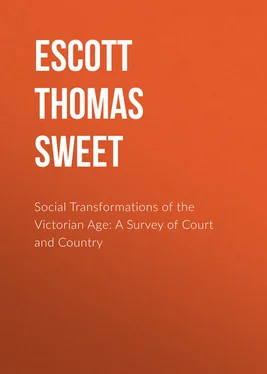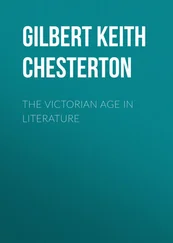The Semitic capitalists of the century have been compared to a foreign garrison quartered in every European country, never completely fused with the native population, always separated from the national life, and potentially hostile to the domestic interests of the land which it occupies. In the case of the financial family whose connection with Victorian England has now been summarized this description is not borne out by the facts. Their activity as financiers and generosity as citizens during calamitous seasons like the Irish famine, are only specimens of the services rendered by the Rothschilds to their adopted country. No exceptional distress comes upon any portion of the United Kingdom without eliciting a letter of womanly sympathy from the Queen, and the opening of a subscription list in the City. At the head of this list the name of the New Court firm is tolerably sure to be seen. Members of a race whose history is like that of the Jews one of razzias, confiscations, disqualifications, patiently borne and slowly overcome, can scarcely be expected to betray no consciousness of these antecedents in their habit and speech. The bearing of the Jew, whatever pinnacle of greatness he may have climbed, is traditionally the bearing of a man on the defensive, prepared, if he sees an opening, to anticipate the necessity of resentment by showing his ability to repel offence. Those who, whether by individual experience or by ethnic tradition, have been schooled in experiences like these, are not likely to show morbid delicacy in their deportment towards others. The mart and the bourse to which the Jews have been driven are defective schools of social culture. Asiatic plutocrats are sure, therefore, wherever they may be settled, to provoke enemies in the very act of creating clients and dependents. The English Rothschilds of every generation have found opportunities of performing private not less than public kindnesses. In spite of, or rather perhaps because of this, they have wounded many susceptibilities, for there may be an insolence of neediness not less than of wealth. Fairness, however, requires the admission that the successive representatives of the great Semitic house in respect of the performance of the duties of citizenship as well as in the wise, not less than the beneficent use of wealth, have set an example to the fellow countrymen of their adoption in general, and to their financial rivals in particular. The employment of great wealth in accordance with the principles of magnificence and of taste was esteemed so highly by the cultivated Greeks of old as to receive from Aristotle a concrete illustration in his category of virtuous characters. The same tradition was preserved and exemplified in those republics of mediæval Italy that wore the closest resemblances to the older democracies of Hellas which history records. It was not unknown in England at that period when London was to the Englishman what Florence had been to the Florentine under the Medici, or, at an earlier age, what the City of the Violet Crown had been to the contemporary of Pericles. A similar sense of the public usefulness and patriotic obligations of great wealth animated the citizens of London under our own Edwards, and had previously found many modes of effective expression under Elizabeth. Those were ‘the gorgeous days’ in which the trader of one of the great chartered companies in the Indies or across the Atlantic, having made some exceptionally successful venture, on returning safely to his native land, and to the township which had been his cradle, was wont to testify his gratitude to Providence by embellishing the place of his birth with buildings or gardens, with galleries or terraces, many of which, as in the case of the gifts of Sir Thomas Gresham, the first of the great loan negotiators, endure to this day, not only in the college which bears his name, but in the Royal Exchange. By no family, not of English birth; by few Englishmen themselves, either under Queen Victoria or her predecessors, have the public and national responsibilities imposed by financial success, or by hereditary millions, on their possessors been recognized so frankly, or been illustrated with so happy and impressive a blend of splendour and propriety, as by the descendents of the bankers of the Princes of Hesse-Cassel who in the first days of this century issuing from their natal judengasse at Frankfort established themselves in England, and at the same time, or shortly thereafter, fixed their emporia in the great Continental capitals as well.
Whatever their natural pride in the creative power of their wealth, no one can lay it to the charge of the Rothschilds that in the use of this instrument they have lost sight of their duties to the land of their adoption. In any faithfully written chronicle of English art or sport since both were organized among us on their present plan, the name of this family must fill no small space. Their services to the breed of horses may be surmised from the popularity of Baron Lionel Rothschild’s success in the race for the Derby with Favonius in 1871, as well as from the popularity which his son has since won in the same pastime. Their private houses are museums of art which have encouraged English not less than Continental talent, and which are open to every visitor who is interested in their contents. Since the Rothschilds were settled in Piccadilly and Mayfair, many others of their race have made a position in the polite life of the capital and of the country. That each of these, to mention only Murrietas, Oppenheims, Bischoffsheims, have fixed the ends and regulated the scale of their expenditure with a regard for refinement as well as pomp, and that the more prominent members of a no longer despised race have been incorporated thoroughly into the ranks of the native gentry, is due largely to the personal initiative and influence of the New Court dynasty. Nor is it merely their wealth and the influence which money has brought that have placed the Rothschilds at the head of Semitic settlers in England. Their loyalty to their nation has never been eclipsed by other interests. They have not only endowed hospitals and built synagogues. They have always exerted a pacific and unifying influence upon the various and sometimes mutually conflicting Hebraic factions; at one time they have reconciled to each other different schools of Teutonic Judaism. At another they have performed the same good office for Israelite communities outside their own Teutonic pale.
CHAPTER VI
SOCIAL CITIZENSHIP AS A MORAL GROWTH OF VICTORIAN ENGLAND
Private and individual efforts which have quickened the sense of citizenship in England and bridged the gulf between rich and poor. Historic and abiding influences of the Young England movement of 1846. How it facilitated the Factory Acts and prompted private owners to open their parks to the public. Temple Gardens and Lincoln’s Inn. Effect produced by the brothers Mayhew with their London Labour and London Poor during the fifties, and also by certain articles in the Times and Quarterly Review . Lord Shaftesbury, the Poor Man’s Peer. Origin of Public School and University settlements in great towns. Edward Denison and his friends before Arnold Toynbee. Individual example acting on public or corporate owners. Educate the public and actuate legislation when the time is ripe for it. Sir Erasmus Wilson’s gift of Cleopatra’s Needle preceded beautification of Thames Embankment.
The practical sense of citizenship by which, in the preceding chapter, the Jewish community in England has been seen to be animated is among native Englishmen themselves pre-eminently the development of the Victorian era. Its manifestation in the capital was preceded by its active display in the provinces. Few individuals of our epoch have more appreciably and definitely impressed the image of their genius on the social history of their age, than Benjamin Disraeli, first, and only, Earl of Beaconsfield. This is not the occasion on which to examine his position in, and services to, the public life of the period, as well as his place in the inner economy of the polite world. In the social movement of the industrial classes of the community, especially in their relations with their more highly placed neighbours, the work done by this remarkable man is not less conspicuous than it is seemingly enduring. 17 17 While Lord Palmerston has become a historical name, Lord Beaconsfield’s precedents are daily, alike by friends and foes, cited as living forces.
The political school which, at the outset of his career his genius created, that of Young England in the ninth year of the present reign, did not last long as a political organization. It was never intended to do so. Of the little coterie whose inspiring literature is contained in the trilogy of romance that is constituted by Coningsby , Sibyl , and Tancred , the sole survivor is the Duke of Rutland. Even he, perhaps, is better known to many readers as Lord John Manners. He was first introduced to the general public by the style of ‘Lord Henry Sidney’ in his friend’s earliest novel. With pardonable pride in a letter incorporated by the editor of the Quarterly Review in an article on Sibyl , 18 18 See Quarterly Review , July, 1896.
the Duke of Rutland points back to the undoubted service which the sentiment generated by the Young Englanders rendered to Lord Shaftesbury, then Lord Ashley, and to Mr Oastler in their gradually successful efforts to pass the First Factory Act as well as generally to soften, perhaps even to sweeten the daily lot of the suffering, the defenceless, and the poor. At that time, the humane and religious fervour of Lord John Russell had not yet leavened, as it soon afterwards did, aristocratic Whiggism. Mr Gladstone’s spiritualizing touch was still to be laid upon the party that he was yet to join. The scientific economists of the school of Peel, comprising as they did Cobden and Bright, were the enemies of the movement. Even the pioneer of that movement, who afterwards nobly vindicated his claim to the title of the Poor Man’s Peer, was indignantly asked what he, Lord Shaftesbury, had been doing, when Lord Ashley was fighting for the Ten Hours Bill of 1844. 19 19 This anecdote was often told by Lord Shaftesbury.
Читать дальше












